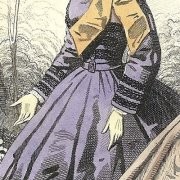Chapbook
'Round Vienna'

Round Vienna is the title of a new chapbook from Vagabond by Kate Lilley, and reminds me that Vienna airport, (my only experience of Vienna) is round. As far as I know, it's the first solo poetry publication from Lilley since her 2002 Salt book, Versary. It is just 4 poems. Yet the elegant production aside - and the splendid (yet understated) sample of images by Melissa Hardie - it does not feel meagre. Titles are important: and if Vienna conjured Freud for you, the first poem title, 'Fraud's Dora' would confirm it. The title is in a sense a balancing of the intellectual weight of the poems: for we are in the realm of psychoanalytic assemblage. There is a similarity here to the poems of Emma Lew in that the lines seem drawn from disparate (if perhaps fictional) sources, yet they present a tonally structured verisimilitude rather than the feel of a field of fragments. Otherwise they are very much their own woman - distinct in terms of rhythm, sensibility and humour:
she did not scruple to appear
in the most frequented streets
she was in fact a feminist
('Sidonie')
Sidonie was a lesbian patient of Freud's, and there is a homoerotic coupling between the poem on the left and Hardie's image on the left. (These images are not just illustrations but poetically apposite in themselves, encouraging a reading of the book as visual poetry.) The hand of a woman gestures over the genital region with her right hand - the hand's gesturing also suggesting female genitals, as does a (further doubling) design on the cuff of the woman's sleeve (if such a truncated image should be referred to as a woman. Note: it is not the image featured above; but of the same family). Such an emphasis mocks Freud's reading of Sidonie the patient: that she 'had become a man'. 'Sidonie' might also be thought of as a pun on 'Sydney', where both Lilley and Vagabond Press are based; the line, 'the deeper heterosexual current/falls to the ground...', though paradoxical in terms of water, evokes to the absurdist Paul Hogan falling off the Harbour Bridge: at the sight of genitals - or of the thought of lesbians or Freud or poetry.
The explicit genitality of these poems, as expressed in wordplay: the prosaic
'vorhof' ['vestibulum'; literally 'forecourt'] -
an anatomical term for a particular
region of the female genitals
('Fraud's Dora')
becomes, by book's end
téleclitoridiennes
mesoclitoridiennes
paraclitoridiennes
('Marie')
It's enough to make you think that Vagabond should be pronounced with a hard 'g'. I haven't read anything like it since the wonderful experimental novel Kathleen Fallon, Working Hot (1989).
There's a langorous resourcefulness to these poems - as if their parts could just fall apart, but they don't. 'Anisotropy' is the title of the second poem; it is the property of being directionally dependent, which, I suppose these poems are, as well as psychoanalysis.
On being given a pencil she calls it a pen-knife
'it is what you write with'
No it is a door key
dull-sharp
salt-sugar
taste and charm
She says they are unalike
o with a piece cut out is e
('Anisotropy')
With that scissoring isotropic move, Lilley makes one of my favourite rhymes of the year, up there with Example's 'You want me to come over I got an excuse/Might be holding your hand but i’m holding it loose'. But that's a world away from Round Vienna.
Australia, Fitzroy